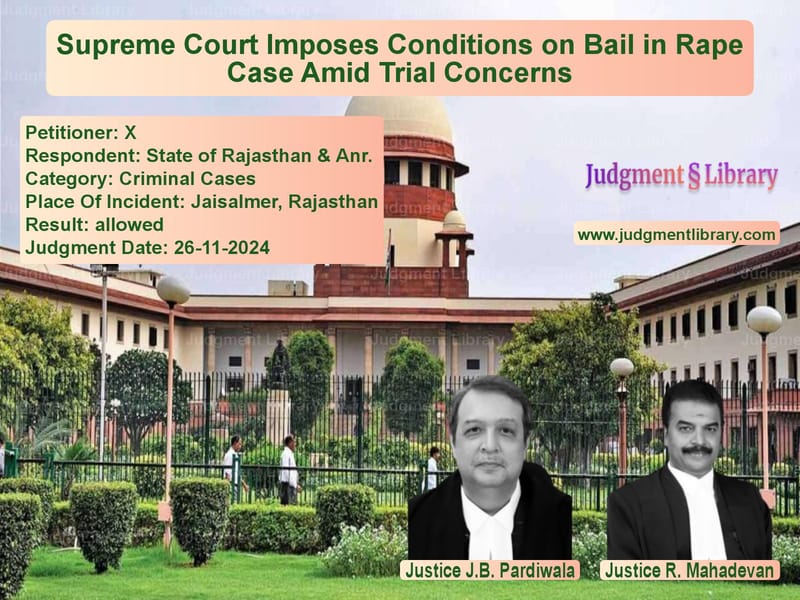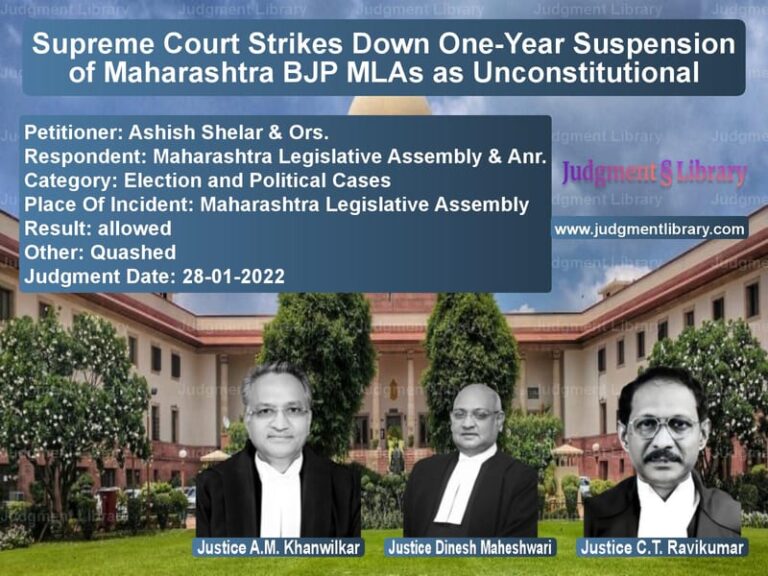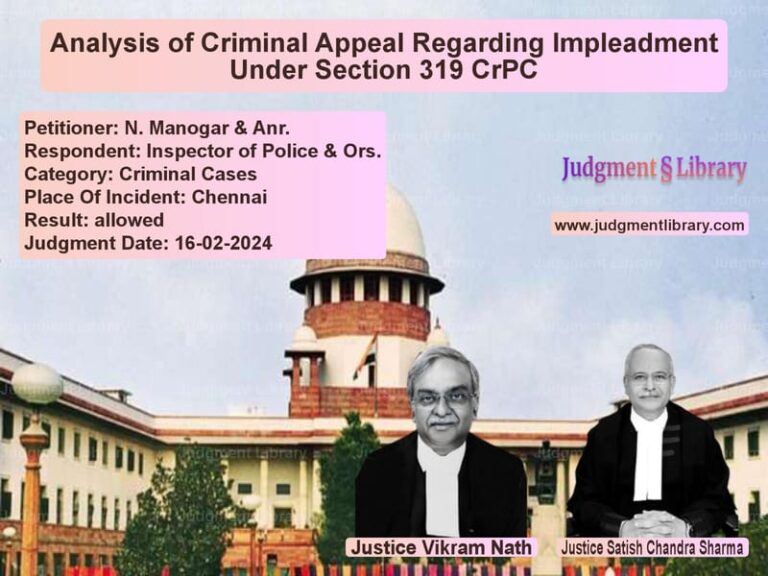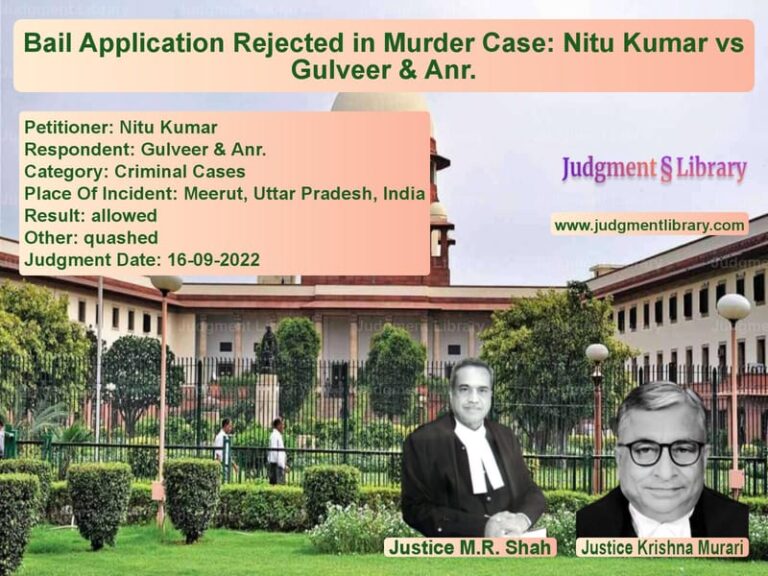Supreme Court Imposes Conditions on Bail in Rape Case Amid Trial Concerns
The Supreme Court of India, in a significant ruling, addressed the issue of granting bail in serious offenses like rape and emphasized the importance of ensuring that judicial discretion does not impact the trial process. The case, X vs. State of Rajasthan & Anr., arose from the bail granted to an accused in a rape case by the Rajasthan High Court. The Supreme Court examined the conditions under which bail was granted and modified the order to ensure that the trial proceeds without interference.
Background of the Case
The case originated from an FIR registered on September 18, 2023, at the Nachna Police Station, Jaisalmer, Rajasthan. The petitioner, who is the victim, filed a complaint against Respondent No. 2 (the accused) and a co-accused under Sections 376D (gang rape) and 342 (wrongful confinement) of the Indian Penal Code.
Both accused were arrested, and while the co-accused was released on bail earlier, Respondent No. 2 continued to be in judicial custody. After the charge sheet was filed and the case was committed to the Sessions Court, the accused moved a bail application before the trial court, which was rejected. He then approached the Rajasthan High Court, which granted him bail on February 12, 2024, citing discrepancies in the victim’s statement.
Key Legal Issues
- Whether bail can be granted in a serious offense like rape when the trial is pending.
- The impact of discrepancies in the victim’s statements on bail decisions.
- Judicial discretion in granting bail and its effect on the trial process.
- Whether additional conditions should be imposed to prevent witness tampering and ensure the fair conduct of the trial.
Arguments by the Petitioner
The victim, through her counsel, argued:
- The Rajasthan High Court erred in granting bail to the accused based on discrepancies in her statements recorded in the FIR and under Section 164 CrPC.
- The accused belongs to the same village as the victim, increasing the risk of intimidation and witness tampering.
- The bail order did not impose any conditions to prevent interference in the ongoing trial.
- Once the trial has commenced, courts should refrain from granting bail unless exceptional circumstances exist.
Arguments by the Respondents
The State of Rajasthan and the accused countered with the following arguments:
- The discrepancies in the victim’s statements created doubt regarding the prosecution’s case, justifying bail.
- The accused had already spent considerable time in judicial custody.
- There was no direct evidence of any attempt to tamper with witnesses.
- The High Court’s discretion should not be interfered with unless it is shown to be manifestly perverse.
Supreme Court’s Observations
The Supreme Court made the following key observations:
1. Courts Should Exercise Caution in Granting Bail After Trial Begins
The Court noted:
“Ordinarily in serious offenses like rape, once the trial commences and the prosecution starts examining witnesses, courts should be loath in entertaining bail applications of the accused.”
2. Pattern of Bail Being Granted at Critical Stages
The Court observed that bail is often granted:
- After the charge is framed and just before the victim is to be examined.
- After the victim’s testimony is recorded, based on minor discrepancies.
It stated:
“This practice undermines the credibility of the trial process. Once the trial commences, it should be allowed to reach its conclusion.”
3. Additional Conditions Needed to Prevent Witness Intimidation
The Court criticized the High Court for granting bail without imposing adequate safeguards:
“Even while enlarging the accused on bail, the High Court should have been conscious of the risk of witness intimidation.”
Final Judgment
The Supreme Court modified the bail order as follows:
- The accused shall not enter his village (Magriyan Ki Dhani Satyaya, District Jaisalmer) until the trial is completed.
- He must furnish an alternate address to the investigating officer.
- He is prohibited from directly or indirectly contacting the victim or her family.
- The trial court is directed to prioritize the case and complete the trial within three months.
Implications of the Judgment
The ruling has significant implications for the judicial approach to bail in serious offenses:
- Prevention of Witness Intimidation: Courts must impose conditions to safeguard victims when granting bail.
- Expediting Trials: Cases involving heinous crimes should be given priority.
- Judicial Accountability: Courts should avoid granting bail solely based on discrepancies in witness statements unless they are substantial.
By modifying the bail order without revoking it entirely, the Supreme Court balanced the rights of the accused with the need to protect the integrity of the trial process.
Petitioner Name: X.Respondent Name: State of Rajasthan & Anr..Judgment By: Justice J.B. Pardiwala, Justice R. Mahadevan.Place Of Incident: Jaisalmer, Rajasthan.Judgment Date: 26-11-2024.
Don’t miss out on the full details! Download the complete judgment in PDF format below and gain valuable insights instantly!
Download Judgment: x-vs-state-of-rajasthan-&-supreme-court-of-india-judgment-dated-26-11-2024.pdf
Directly Download Judgment: Directly download this Judgment
See all petitions in Bail and Anticipatory Bail
See all petitions in Custodial Deaths and Police Misconduct
See all petitions in SC/ST Act Case
See all petitions in Judgment by J.B. Pardiwala
See all petitions in Judgment by R. Mahadevan
See all petitions in allowed
See all petitions in supreme court of India judgments November 2024
See all petitions in 2024 judgments
See all posts in Criminal Cases Category
See all allowed petitions in Criminal Cases Category
See all Dismissed petitions in Criminal Cases Category
See all partially allowed petitions in Criminal Cases Category







